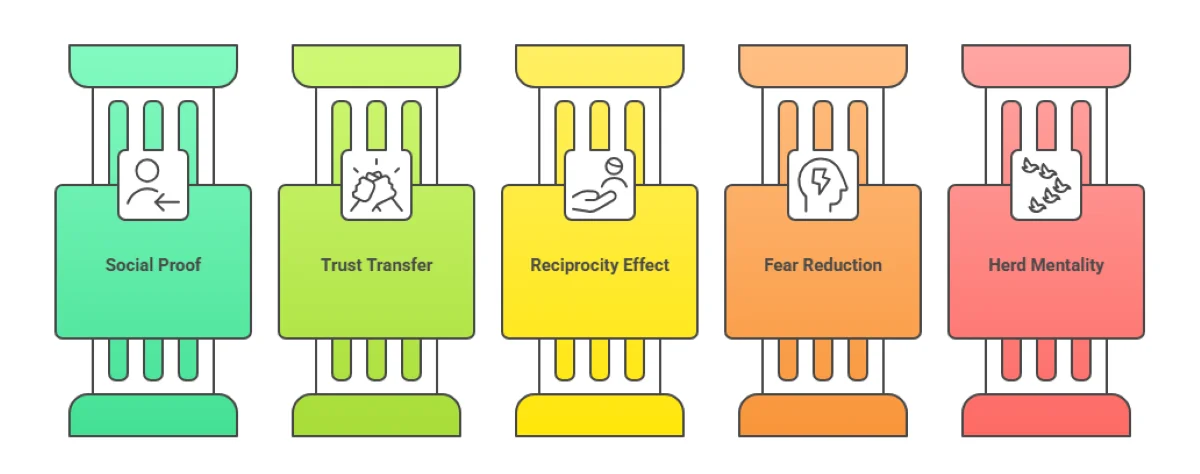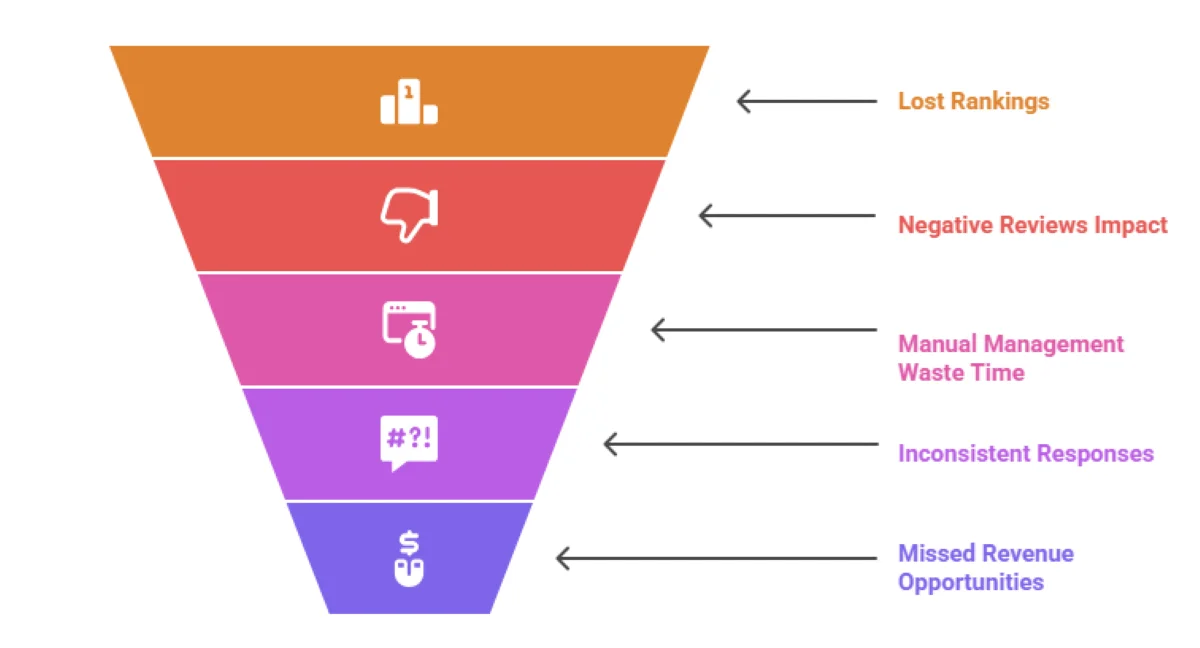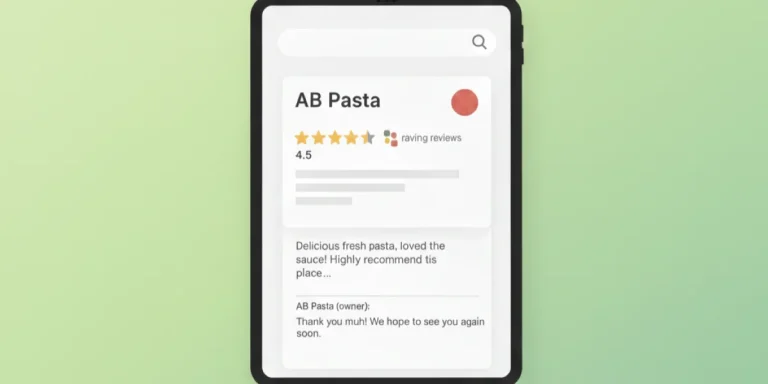
Understanding why Google reviews are important for small businesses has become critical in today’s digital marketplace. In 2024, research consistently shows that approximately 81% of consumers check Google reviews before engaging with a business, which is a significant increase from previous years.
This shift represents more than a trend; it’s a fundamental change in how customers discover, evaluate, and choose local businesses. Small businesses that master Google review management gain significant competitive advantages in visibility, trust, and revenue generation.

The psychology behind why Google reviews work

Consumer psychology drives review effectiveness through predictable behavioral patterns that smart businesses leverage for growth and customer acquisition strategies.
Social proof principle in action
People naturally follow others’ behaviors when uncertain about purchasing decisions. Reviews provide instant validation that others have successfully chosen your business, reducing customer anxiety significantly. This psychological trigger influences a substantial majority of consumers who trust online reviews similarly to personal recommendations from friends and family.
Trust transfer from peer recommendations
Reviews act as digital word-of-mouth marketing, transferring trust from satisfied customers to prospects effectively. This peer-to-peer credibility carries significantly more weight than traditional advertising methods. Customers view reviews as unbiased opinions from people like themselves, making them incredibly powerful for building business credibility and attracting new customers.
The reciprocity effect creates review motivation
Customers who receive exceptional service feel psychologically obligated to reciprocate through positive reviews, creating natural feedback loops for quality-focused businesses. This reciprocity principle drives a significant percentage of consumers to leave reviews when asked directly. The psychological contract between great service and review generation becomes a sustainable competitive advantage for businesses.
Fear reduction in purchase decisions
Reviews address prospect concerns before they arise, reducing purchase hesitation by providing real experiences from similar customers who faced comparable decisions. This fear reduction mechanism is potent for higher-priced services where customer risk perception is elevated. Reviews essentially provide risk mitigation through social proof validation from previous satisfied customers.
Herd mentality drives business selection
When customers see multiple positive reviews, they assume the business must be excellent since “everyone else” chose it, triggering powerful herd behavior psychology. This effect intensifies with review volume. Businesses with substantial review counts perform better than those with fewer reviews. The psychological safety of following the crowd makes decision-making easier for uncertain prospects.
What do customers look for in reviews?
Research analyzing customer review patterns reveals specific attributes that drive customer decisions and business success across industries.
Staff friendliness dominates customer priorities
Staff friendliness appears as one of the most mentioned attributes in small business reviews across every industry, making employee training crucial for reputation success. This finding spans restaurants, retail, services, and professional businesses consistently. Investing in staff training for friendliness directly impacts review quality and customer satisfaction scores significantly across all business types.
Service professionalism drives five-star reviews
Professional conduct appears significantly more frequently in five-star reviews than in one-star reviews, making staff professionalism a critical success factor for reputation management strategies. Customers specifically mention professional behavior, competence, and ethical conduct when leaving positive reviews. This correlation demonstrates that professionalism training directly translates to improved review ratings and customer satisfaction.
Product selection influences customer satisfaction
Broad product or service selection appears more often in positive reviews, indicating customers value choice and comprehensive offerings from local businesses. Variety and selection give customers confidence that they’ll find exactly what they need. Businesses with limited offerings should emphasize quality and expertise to compensate for reduced selection in their customer communications and marketing materials.
Fair pricing creates customer advocacy
Fair pricing mentions appear more frequently in five-star reviews, showing customers appreciate transparent, reasonable pricing over bargain-basement or premium positioning strategies. Customers specifically call out fair pricing when they feel they received excellent value. Price transparency and clear communication about costs help generate positive pricing mentions in customer reviews consistently.
Industry-specific priorities vary significantly
Different industries have varying review focus areas: restaurants emphasize food quality, retail focuses on staff helpfulness, while service businesses prioritize technician professionalism. Understanding industry-specific priorities helps businesses focus improvement efforts on attributes customers care about most. Tailoring service delivery to industry expectations drives better review outcomes and customer satisfaction.
Google reviews and local SEO rankings
Google reviews directly impact local search visibility through algorithmic factors that determine which businesses appear prominently in search results and map packs.
Reviews trigger the ranking boost threshold
Research shows businesses experience noticeable ranking improvements when reaching ten reviews, with diminishing returns beyond this critical threshold for local search optimization. This threshold represents a proven ranking factor that small businesses can achieve relatively quickly. Focusing initial efforts on reaching ten quality reviews provides a strong return on review management investment.
Reviews contribute to local search visibility
Google reviews contribute to local search ranking factors as one component among many algorithmic considerations, making them an important controllable element in local SEO strategy implementation. This ranking influence means review management directly impacts business discoverability. Unlike many other SEO factors, reviews are completely within business control through excellent service and strategic review collection efforts.
Fresh review velocity matters most
Recent reviews carry more algorithmic weight than older ones, with 73% of consumers only trusting reviews written within the last month for decision-making. Google’s algorithm favors businesses with consistent, fresh review generation over those with many old reviews. Maintaining steady review velocity through ongoing customer engagement keeps businesses competitive in local search results.
Voice search optimization through reviews
Review content helps businesses rank for voice searches and “near me” queries, capturing the growing mobile and voice search market effectively. Voice searches often include conversational language that matches review content naturally. Businesses with keyword-rich reviews from customers perform better in voice search results, especially for local discovery queries.
Star ratings impact click-through rates
Businesses with ratings in the 4+ star range achieve better click-through rates, while perfect 5.0 ratings may sometimes appear less authentic to consumers. This optimal rating range appears most credible to consumers making purchasing decisions. Mixed ratings with mostly positive reviews create authentic profiles that generate higher engagement than perfect ratings.
Building customer trust and reputation

Google reviews serve as the primary trust-building mechanism for small businesses in an increasingly skeptical digital marketplace where credibility determines success.
Reviews equal personal recommendations
Research consistently shows that a high percentage of consumers trust online reviews similarly to personal recommendations, making review management equivalent to word-of-mouth marketing on a massive scale. This trust level means reviews function as scalable referral systems for businesses. The psychological impact of peer recommendations through reviews rivals traditional networking and referral programs.
Mixed review profiles appear more authentic
Businesses with mixed ratings (including some 3-4 star reviews) appear more trustworthy than those with only five-star reviews, which customers increasingly question. Authentic review profiles with occasional negative feedback actually build more credibility than perfect ratings. Customers expect some negative experiences and appreciate businesses that handle criticism professionally.
Response strategy retains customer interest
Responding to negative reviews can retain a good percentage of potential customers who would otherwise choose competitors, making a response strategy crucial for reputation recovery efforts. Professional responses demonstrate customer service commitment and problem-solving abilities publicly. These responses often become more valuable than the original review for showcasing business character.
First impression formation through reviews
Google reviews often provide customers’ first impression of businesses, occurring before website visits or direct contact with company representatives. This first impression shapes customer expectations and purchase likelihood significantly. Businesses must ensure their review profile accurately represents their service quality and brand values consistently.
Competitive advantage through review management
Superior review profiles create sustainable competitive advantages, as customers actively compare review quality when making business decisions between similar providers. Review management becomes a differentiating factor in competitive markets. Businesses with better review strategies consistently win customers from competitors with inferior review profiles.
Revenue and conversion impact
Google reviews directly correlate with revenue growth and conversion optimization across small business categories in measurable ways.
Review count drives revenue growth
Businesses with substantial review volumes consistently outperform those with fewer reviews in revenue generation. This revenue correlation demonstrates the direct financial impact of review management efforts. The relationship between review count and revenue growth makes review generation a high-priority business investment.
Star rating increases drive revenue growth
Each additional star in the average rating generates measurable revenue increases, making reputation improvement directly tied to financial performance and profitability metrics. This granular revenue impact means even small rating improvements generate measurable business results. Businesses can calculate ROI on customer service improvements through rating increases.
Higher-priced items see conversion increases
Products and services with reviews see significantly higher conversion rates for higher-priced items, justifying premium pricing through social proof validation mechanisms. This conversion boost is particularly significant for businesses offering expensive services or products. Reviews reduce purchase anxiety for high-value transactions by providing risk mitigation.
Positive reviews enable premium pricing
Businesses with excellent review profiles can charge premium prices because customers perceive higher value through peer validation and reduced risk perception. Premium pricing becomes sustainable when supported by strong review profiles. Customers willingly pay more for businesses with proven track records through positive reviews.
Review quality impacts customer lifetime value
Customers acquired through positive review discovery tend to spend more than those from other channels, indicating higher lifetime value potential and retention rates. Review-driven customers arrive with higher trust levels and expectations, leading to better relationships. These customers also become more likely to leave positive reviews themselves.
Review management best practices
Strategic review management requires systematic approaches to collection, response, and optimization for maximum business impact and customer satisfaction across all touchpoints.
Optimal timing for review requests
Request reviews immediately after positive service experiences or through follow-up emails within 24-48 hours when satisfaction is highest and memories remain fresh. Timing significantly impacts response rates and review quality from customers. The window of peak satisfaction provides the best opportunity for generating positive reviews.
The multi-channel request strategy works best
Combine in-person requests, email follow-ups, and SMS reminders, as customers respond better when approached through their preferred communication method. Different customers prefer different communication channels for review requests. A multi-channel approach maximizes response rates by meeting customers where they’re most comfortable.
Response speed affects customer retention
Respond to negative reviews within 24-48 hours and positive reviews within one week to demonstrate responsiveness and customer service commitment to prospects. Response timing signals business priorities and customer care levels to potential customers. Quick responses show active management and concern for customer satisfaction.
Staff training creates natural opportunities
Train employees to naturally incorporate review requests into customer interactions, making the process feel organic rather than pushy during service delivery. Well-trained staff can identify satisfied customers and make appropriate review requests. Natural integration into service workflows improves request acceptance rates significantly.
Professional response tone builds trust
Maintain professional, helpful tones in all responses, addressing concerns constructively and thanking customers for feedback regardless of the rating received. Response tone reflects the business character and professionalism to potential customers reading reviews. Consistent professional responses build brand credibility and customer confidence.
The hidden costs of poor review management

Neglecting Google review management creates cascading business costs that compound over time and damage long-term growth potential and competitive positioning.
Lost rankings to better-managed competitors
Competitors with superior review profiles consistently outrank businesses with poor review management, capturing market share and customer attention in local searches. Search algorithm preferences for review-rich businesses create sustainable competitive disadvantages. Lost rankings translate directly to reduced visibility and customer acquisition opportunities.
Negative reviews impact customer acquisition
Negative reviews can significantly impact potential customer decisions, while multiple negative reviews compound the effect on prospect conversion. This customer loss multiplies over time, creating a substantial revenue impact from reputation damage. Unmanaged negative reviews continue affecting business prospects without intervention.
Manual management wastes valuable time
Business owners spending hours manually managing reviews lose opportunity costs that could be invested in core business operations and growth initiatives. Time spent on manual review management doesn’t scale effectively with business growth. Inefficient review management prevents focus on revenue-generating activities.
Inconsistent responses damage brand perception
Sporadic or poorly written responses to reviews create negative brand impressions and suggest unprofessional business management to potential customers reading profiles. Inconsistency in review responses reflects poorly on overall business operations and attention to detail. Professional reputation requires consistent, high-quality customer communication.
Missed revenue opportunities from a poor strategy
Businesses without systematic review collection strategies miss potential revenue from improved rankings, trust, and conversion optimization over time. Poor review strategy creates ongoing competitive disadvantages that compound over time. Strategic review management becomes increasingly important as markets become more competitive.
Common review management mistakes to avoid
Small businesses often make predictable mistakes that undermine review effectiveness and can violate platform policies, damaging long-term success and reputation.
Incentivizing reviews violates Google policies
Offering discounts or rewards for reviews violates Google’s terms of service and can result in review removal and business profile penalties. Policy violations can result in complete review removal and ranking penalties. Authentic review generation requires focus on service quality rather than artificial incentives.
Generic response templates reduce trust
Customers easily identify copy-paste responses, which appear insincere and damage the personal connection that makes reviews effective for trust-building with prospects. Generic responses suggest businesses don’t value individual customer feedback or experiences. Personalized responses demonstrate genuine care for customer relationships and feedback.
Ignoring negative reviews amplifies problems
Unresponded negative reviews suggest poor customer service and can discourage potential customers more than the original complaint itself. Ignoring negative feedback signals business indifference to customer satisfaction and problems. Professional responses can actually improve business perception despite negative review content.
Focusing only on volume over quality
Pursuing review quantity without ensuring service quality leads to negative reviews that damage reputation more than no reviews would. Quality service must precede review generation efforts for sustainable success. Volume without quality creates unsustainable review strategies that eventually backfire.
Missing competitive intelligence opportunities
Failing to monitor competitor reviews means missing valuable market insights about customer preferences and industry trends that inform strategic business decisions. Competitor review analysis reveals market opportunities and customer expectation changes. This intelligence helps businesses stay competitive and responsive to market evolution.
How Spreadical solves every review challenge
Spreadical provides comprehensive AI-powered review management that transforms reputation challenges into automated growth engines for small businesses seeking scalable solutions.
Instant Google review sync
Automatically fetch every new Google review in real time without manual checks needed. Never miss customer feedback again with instant notifications and seamless integration.
AI-smart reply drafts
Send on-brand replies crafted by AI to match your tone and customer sentiment perfectly for every single review received.
Improve with a feedback loop
Fine-tune AI replies over time using your feedback for smarter, more personalized responses that better represent your unique business voice and style.
WhatsApp review control
Approve, edit, or auto-post replies to Google reviews directly through WhatsApp for convenient mobile management from anywhere, anytime you need instant access.
Secure cloud storage
All Google reviews and replies are safely stored and searchable anytime in cloud storage for complete historical record keeping and business analytics needs.
One-stop Google integration
Manage all your Google reviews from one powerful, easy-to-use dashboard that centralizes every aspect of your comprehensive reputation management strategy effectively.

FAQs
Why are Google reviews important for small businesses?
Google reviews are crucial because approximately 81% of consumers check them before engaging with businesses. They impact local SEO rankings, build customer trust through social proof, and directly correlate with revenue growth. Businesses with substantial review volumes consistently outperform those with fewer reviews.
Do Google reviews really affect SEO rankings?
Yes, Google reviews contribute to local search ranking factors as one important component among many algorithmic considerations. Businesses see ranking boosts when reaching 10 reviews, and fresh review velocity helps with voice search and “near me” queries that drive local traffic.
How do Google reviews influence customer decisions?
Reviews influence decisions through social proof psychology. Research shows that consumers trust reviews similarly to personal recommendations. Customers compare review profiles when choosing between competitors, making review quality a competitive differentiator.
Can responding to Google reviews improve my business reputation?
Absolutely. Responding to negative reviews can retain a significant percentage of potential customers who would otherwise choose competitors. Quick, professional responses demonstrate customer service commitment and can turn negative experiences into positive impressions.
How many Google reviews does a small business need?
Research shows 10 reviews trigger ranking boosts, while businesses with substantial review volumes generate significant revenue increases compared to the average. However, consistent fresh reviews matter more than total volume for long-term success.
What happens if my business has bad Google reviews?
Bad reviews can significantly impact potential customer decisions. However, responding professionally, addressing concerns, and generating fresh positive reviews can recover reputation and demonstrate commitment to improvement.
Can I automate Google review management?
Yes, tools like Spreadical automate review requests, responses, and monitoring while maintaining authenticity. Automation ensures consistent review collection and professional responses without violating Google’s policies against incentivized reviews.
Are fake Google reviews harmful to small businesses?
Fake reviews violate Google policies and can result in penalties. More importantly, customers increasingly recognize inauthentic reviews, and mixed review profiles appear more trustworthy than suspiciously perfect ratings.
How can I get more positive Google reviews for my small business?
Request reviews immediately after positive service experiences, train staff to naturally incorporate requests, use follow-up emails within 24-48 hours, and maintain excellent service quality that motivates customers to share experiences.
What’s the best Google review management tool for small businesses?
Spreadical offers comprehensive AI-powered review management, including automated requests, professional responses, real-time monitoring, and competitive analytics, specifically designed for small businesses needing efficient, policy-compliant review strategies.


